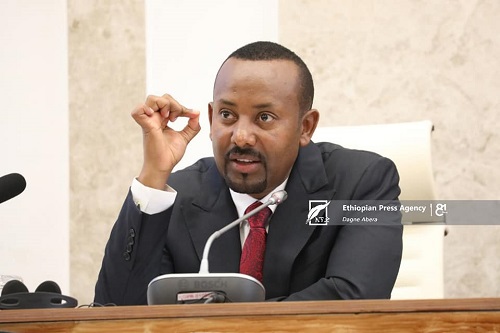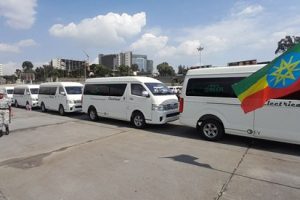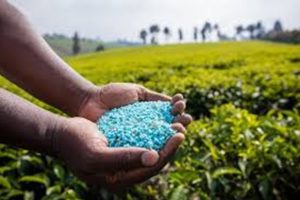
BY DANIEL ALEMAYEHU
Amazing achievements have been registered in Ethiopia since the reform took place four years ago, said Prime Minister Abiy Ahmed (PhD) while addressing the questions raised by House of People’s Representatives (HPR) on various issues yesterday. On the1st year, 13th regular session of the 6th House of People’s Representatives of the FDRE assembly; people’s representatives have raised a number of questions that need the Prime Minister’s response.
In his explanation, the Prime Minister underscored that the representatives should consider the challenges the country has been facing in the past three- four years. One big challenge was the outbreak of the global pandemic, COVID-19, that caused great loss of human life and resource worldwide. No one could imagine such disaster earlier to the reform period. So, when raising questions or criticizing some substandard achievements, everyone including the HPR, should take into account this back bending occurrence and its impact on developing countries including Ethiopia.
The Prime Minister said that among the major factors that hindered the progress of the economic achievement was the war took place in the northern part of the country. Every war has its own consequence on the economic activities of a country. For instance, the war underway between Russia and Ukraine has its own adverse impact since development goes smoothly under the prevalence of peace everywhere. External pressures on the government have also played their own destructive role. “Thus, considering natural and man- made challenges we faced gives better insight to weigh our progress,” he remarked.
On the other hand, every challenge brings its own blessing when handled properly, the Prime Minister said. The global pandemic, for instance, brought a chance for the country to find a way to plough every land available. This enabled to produce wheat in a better quality and quantity. In the current situation of the Russia- Ukraine war, most African countries have been suffering from the shortage of wheat. Ethiopia, however, is thinking about wheat exportation upon satisfying local needs. In this regard, the reform has registered marvelous and tangible achievement.
One of the reform’s achievements is the road construction carried out by Ethiopian Road Administration (ERA) throughout the country. Figures tell that there is a huge difference before and after the reform in this sector. The Premier noted that, the national road network before the reform was 127,000 kilometers. After the reform, this number has raised to 165,000 kilometers. In addition, ERA has registered better performances in the past few years. Regarding ERA, before the reform, the administration has built 13,000 kilometers of concrete asphalt. Comparing this number with the achievement in the past three- four years, the administration has built 22,000 kilometers. The reform brought this kind of successes.
The Prime Minister also disclosed reforms undertaken in the metropolis. He said that especially, in the past 3 years, the government has built 151 kilometers of concrete asphalt in Addis Ababa. Some roads even have up to 60 meters width. Moreover, 470 kilometers of cobblestone roads have been constructed. He further mentioned that, around 116 kilometers of walkways have been constructed. This is tangible performance. Crossovers and tunnels have also been constructed in Addis.
On the other hand, to mention one specific performance, there were challenges regarding road construction in West Gojam Zone. However, in the past two and half years, it was possible to construct 504 kilometers of concrete asphalt roads. Such constructions have been progressed in regions that were left out in the past years. “If we add construction in the pipeline, the figure elevate up to 40 percent. With those challenges, we have achieved better regarding road construction, but we believe that it is not sufficient.”
The other amazing achievement registered after the reform is that concerns Ethiopian Airlines. Before the reform, it owned around 100 aircrafts. But now, it has 135 aircrafts that indicates 35 percent growth. Following the reform, the number of international destinations has also grown from 115 to 127. In line with this, the airlines revenue is increased from 3.3 billion USD to 4.8 USD. Earlier to the reform, Bole International Airport was providing passenger and cargo services to around 6 million passengers; this time, however, the number has surged to 22 million. This achievement has been registered in the time of the global pandemic, COVID-19, when many airlines were shut down throughout the world.
The other dramatic change is in the telecommunication sector. The reform has also made the company achieve better. The Premier mentioned that before the reform, telecom customers were around 38 million. Today, it has 65.5 million customers. This figure rose up by 27.6 million customers after the reform. Regarding telecom revenue, the company’s achievement is accelerated to 55 billion Birr from 33.5 billion Birr before the reform. It has shown 21.5 billion Birr difference. From international income, the figure has doubled itself after the reform, from 70 million to 135 million USD. What makes this success more amazing is it has provided the services with big discount. No one can deny that there is a tangible change, but it is agreeable that more effort should be exerted to reach the expectation. “We started the telebirr technology last year. This time, it has 20 million customers with 20 billion Birr transaction. This figure is higher than that of the whole Ethiopian banks’ transactions.”
A question was also raised regarding project accomplishment like sugar factories. The Premier reaffirmed that there were problems in sugar production. Before the reform, the number of sugar factories in the country was only four. After the reform, this number increased to nine sugar factories. The land cultivated for sugarcane plantation has also grown up from 30,000 hectares to 100,000 hectares. As a result, sugar production rose from 200,000 tons to 360,000 tons.
In relation to school construction, Prime Minister Abiy Ahmed noted that there are numerous challenges regarding education. However, in the past three years, 2150 schools were built from KG to high schools. 15 thousand classrooms were also added in the existing schools to apply personal distancing protocol in the time of COVID-19. Besides, 1.7 million students are benefited from the schools feeding program. These students eat twice a day.
The Prime Minister has also disclosed about the movement started by the Ministry of Industry dubbed ‘Let Ethiopia Produce’ with the objective of increasing the level of industries’ production by 50 percent. This movement has scored sounding accomplishments. Before the reform, Ethiopia had only three operational industrial parks. After the reform, it could build 12 industrial parks, 3 agro and 9 industrial parks. If problems related with energy, bureaucracy, and others are solved, the sector can produce more, the Premier highlighted. Though the country is expelled from AGOA, its export has been increasing. “We have also been working aggressively on import- substitution,” he noted.
Being a back bone of the nation’s economy, agriculture was also given special consideration during the reform period as of the Premier. He said that 5000 tractors are used this year. This means that 28 percent of the land is ploughed using mechanization. Not only that, 45 percent of the land was ploughed via cluster scheme. As a result, 336 million quintals of crops could be produced in the autumn season.
“We are also expecting a minimum of 24 million quintals of crops from summer wheat production. The agriculture sector has got one- third of the loan that the government provided to the private sector. From 267 billion Birr loan the government provided, 73 billion Birr (1.2 billion USD) or 34 percent of it went to agriculture sector. The government has also supported 15 billion Birr for the purchasing of fertilizer,” he said.
In relation to fruit and vegetable production and the green legacy, the country could earn 82.9 million USD from export. Coffee export alone earned one billion USD. This indicates that export is increased by one- third of the previous figure.
The most important question to be addressed, as to the Premier, is the query of inflation that affects mostly the low income community which is its ugly part. Here, it is essential to understand the situation around the world in which many countries are suffering from inflation.
According to the Premier, the government has taken actions to cope up with the inflation. The wheat production has its own impact. There are various subsidies on electric, petrol, fertilizer, and even water. Following the application of Franco-valuta, the government lost 30 billion Birr. This is to support the poor. In addition, the government feeds 628,000 students in Addis Ababa. There are also 6 centers to feed the poor at least once a day and 6 more are to be added. Bread production capacity is increased from 20 thousand to 2 million from just two factories, Sheger and Birhan. There is a plan to increase the number of the factories by 10 to produce 3.4 million bread per day.
As to the Prime Minister, the reason behind such performances especially in export is the decision made to devalue the money. The Birr was overvalued. The step made to devalue the money has brought myriads of benefits. Among others increment in the formal remittance and export trade are the major benefits, he said.
The Ethiopian Herald June 15/2022





